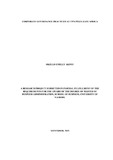| dc.description.abstract | Corporate Governance aims at enhancing internal governance practices through
structures and control mechanisms that result in efficient and effective operations.
Primarily, good governance practices demand a separation of roles between boards and
management to strengthen adequate oversight and supervision, critical in avoiding
conflict and ensuring clear accountability. Poor governance renders an organization an
underperformer which fails to accomplish stated goals, and stands to lose the backing and
goodwill of various shareholders. Government bodies, the private sector and the
nonprofit sector alike have adopted corporate governance practices in an attempt to
streamline accountability, responsibility and transparency measures within. Organizations
operate in complex and dynamic environments that require complex, but flexible,
governance regulation reflecting the uniqueness of each situation arising from specific
factors such as legal and financial systems, culture, corporate ownership structures and
economic conditions. This analysis cannot be truer in the case of international
nongovernmental organizations which have to contend with starkly different socioeconomic,
cultural and political country contexts and internal upheavals but against
which their mandate should be carried out with a stakeholder-approved satisfactory level
of success. This objective of this study was to establish corporate governance practices at
Twaweza East Africa. Methodology adopted was a case study with primary data
collected from 8 respondents spread across key departments and secondary data from past
reports and operating manuals, with Qualitative Data Analysis used to process this data.
Findings show that the organization is currently in a state of transition as it refocuses
implementation of multiple sector projects in Tanzania and education in Kenya and
Uganda. There is reorganization in terms of structure, but most governance elements
remain. An overarching Governing Board and a visible Advisory Board aside,
respondents singled out the use of controls on procurement procedures for example
heavily documented tendering processes, auditing and accounting, programmatic
evaluation, and resource management including governance checks on potential partners,
as mechanisms that support corporate governance. Board diversity, communication and
overlap in program implementation responsibilities distorting supervision and
accountability lines were noted to be challenges. It is recommended that Twaweza
achieves gender and geographical diversity in its boards, draw on communication to
create a culture that sees increased information sharing and ownership of organization
values that will enhance compliance to policies beyond fear of sanctions. It should also
address overlaps in responsibilities and embrace rigorous self-assessment beyond budget
tracking to include qualitative performance audits with governance challenges revealed
serving to foster need for internal self improvement. Study limitations experienced
included time, refusal to divulge information by some respondents whilst others were not
well acquainted with the concept of corporate governance and questioned its application
to nongovernmental organizations. Suggestions for further research are a study that links
impact of corporate governance practices to NGO performance from the perspective of
stakeholders, a study that carries out stakeholder mapping beyond donors to identify
other stakeholders and explore in what ways they can hold NGOs accountable and
finally, a study that explores the extent to which founders influence application of
corporate governance practices in their organizations. | en |

